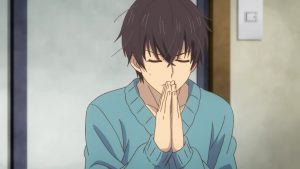 This isn’t the first time I’ve said it about Doukyonin wa Hiza, Tokidoki, Atama no Ue., but I needed a little recovery time after that episode. There are two sides to the coin that is the harmonic resonance this series shares with me. Obviously it connects with me very strongly based on the almost surreal overlap between its narrative universe and my sensibilities and experiences. But it also hits me like a ton of bricks when it decides to go for the emotional sucker punch. Doukyonin wa Hiza knows exactly where my solar plexus is and isn’t afraid to whack me on it.
This isn’t the first time I’ve said it about Doukyonin wa Hiza, Tokidoki, Atama no Ue., but I needed a little recovery time after that episode. There are two sides to the coin that is the harmonic resonance this series shares with me. Obviously it connects with me very strongly based on the almost surreal overlap between its narrative universe and my sensibilities and experiences. But it also hits me like a ton of bricks when it decides to go for the emotional sucker punch. Doukyonin wa Hiza knows exactly where my solar plexus is and isn’t afraid to whack me on it.
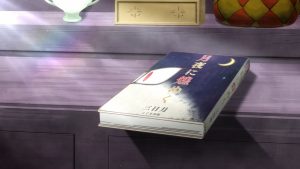 The loss of parents is a common theme in anime of course (not to mention one of those resonance points), but rarely have I seen it depicted so poignantly as with this series. This idea that Subaru’s mother was bringing home flowers from all their trips as a way to share them with him… That’s a low blow, especially when you consider that she never told him about what she was doing. And he never really noticed, either – a random “where those flowers always there?” being the proof of that. Turns out their neighbor (Tarou’s master) had been furtively watering them all these years.
The loss of parents is a common theme in anime of course (not to mention one of those resonance points), but rarely have I seen it depicted so poignantly as with this series. This idea that Subaru’s mother was bringing home flowers from all their trips as a way to share them with him… That’s a low blow, especially when you consider that she never told him about what she was doing. And he never really noticed, either – a random “where those flowers always there?” being the proof of that. Turns out their neighbor (Tarou’s master) had been furtively watering them all these years.
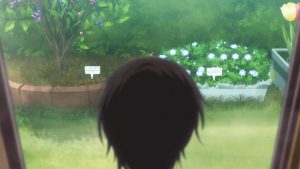 There’s a ton of subtext to this very symbolically powerful chain of events. Subaru feels a little bit defective because he was never able to give his mother what she so dearly wanted – a son with whom she could share her love of adventure, and not have to worry about so much. He knows she didn’t love him any less because he was never that son, but somehow that surely makes him feel even worse. Since they could never bring their son to the world, Subaru’s parents did their best to bring the world to their son. That’s the depth of a parent’s love.
There’s a ton of subtext to this very symbolically powerful chain of events. Subaru feels a little bit defective because he was never able to give his mother what she so dearly wanted – a son with whom she could share her love of adventure, and not have to worry about so much. He knows she didn’t love him any less because he was never that son, but somehow that surely makes him feel even worse. Since they could never bring their son to the world, Subaru’s parents did their best to bring the world to their son. That’s the depth of a parent’s love.
 In the wake of this personal bombshell, Subaru receives two visitors – Kawase-san (of course) and Nana’s brother Yugo, who finally turns up to close the loop on the unfinished business after Subaru’s visit to the Ookami home. Not to be dismissed lightly is Yugo’s admission that Subaru’s writing gives him the courage to escape his own comfort zone, which is one of the most powerful things a writer can hear. The reason for Kawase’s visit is to follow up on Subaru’s progress with a new novel – progress which has basically been non-existent. He suggests that Subaru might benefit from a change of scenery, but the headline here is that Subaru is intrigued by the idea.
In the wake of this personal bombshell, Subaru receives two visitors – Kawase-san (of course) and Nana’s brother Yugo, who finally turns up to close the loop on the unfinished business after Subaru’s visit to the Ookami home. Not to be dismissed lightly is Yugo’s admission that Subaru’s writing gives him the courage to escape his own comfort zone, which is one of the most powerful things a writer can hear. The reason for Kawase’s visit is to follow up on Subaru’s progress with a new novel – progress which has basically been non-existent. He suggests that Subaru might benefit from a change of scenery, but the headline here is that Subaru is intrigued by the idea.
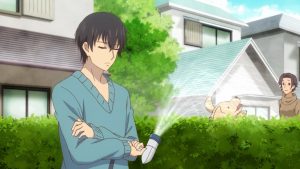 Indeed, Subaru’s growth continues apace. It comes from the revelation that what he does impact’s people’s lives – if it can give courage to people like Yugo and the boy at the book signing, how can Subaru not at least try to live up to their example? And it comes from the doors being Haru’s human has opened up for him – both by the practical necessity of learning how to share his life with a cat, and by the subtle changes learning how to care for another living creature have catalyzed in him. He wants to live up to his responsibilities as an author, and knows being at home hasn’t been working to inspire him. And he wants to try and be the person his parents always wanted him to become.
Indeed, Subaru’s growth continues apace. It comes from the revelation that what he does impact’s people’s lives – if it can give courage to people like Yugo and the boy at the book signing, how can Subaru not at least try to live up to their example? And it comes from the doors being Haru’s human has opened up for him – both by the practical necessity of learning how to share his life with a cat, and by the subtle changes learning how to care for another living creature have catalyzed in him. He wants to live up to his responsibilities as an author, and knows being at home hasn’t been working to inspire him. And he wants to try and be the person his parents always wanted him to become.
 As for where to go, the answer comes via another poetically beautiful notion – the empty planter in the garden that was ticketed for Saho-san’s next batch of seedlings. That’s Tokushima, on Shikoku. And naturally enough when Kawase makes the travel arrangements, one of the hotel options he gives Subaru is the ryokan where his parents were planning to stay on what turned out to be their final trip. But there’s still the matter of what to do about Haru – always a worry for any anxious cat person. Nana-san suggests a pet hotel, but Haru is having none of that. Subaru eventually elects to have Hiroto swing by and feed Haru – not an ideal solution, but at least one that allows her to remain in the comfort of her home.
As for where to go, the answer comes via another poetically beautiful notion – the empty planter in the garden that was ticketed for Saho-san’s next batch of seedlings. That’s Tokushima, on Shikoku. And naturally enough when Kawase makes the travel arrangements, one of the hotel options he gives Subaru is the ryokan where his parents were planning to stay on what turned out to be their final trip. But there’s still the matter of what to do about Haru – always a worry for any anxious cat person. Nana-san suggests a pet hotel, but Haru is having none of that. Subaru eventually elects to have Hiroto swing by and feed Haru – not an ideal solution, but at least one that allows her to remain in the comfort of her home.
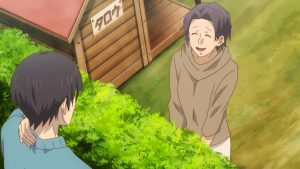 If one needed evidence of just how thoroughly Subaru has succumbed to Haru life, he’s using a scale to measure her food and the first thought when he sits down in his room at the ryokan (where the owner’s daughter has recognized his name from his parents cancelled reservation three years earlier) is “I should have brought her with me”. Not only is Haru part of his life now, but part of his creative process. Subaru is initially unsure of what to do with himself in Tokushima, but a brochure in the lobby leads him to a museum celebrating the blue dye that’s a staple of the local arts and design.
If one needed evidence of just how thoroughly Subaru has succumbed to Haru life, he’s using a scale to measure her food and the first thought when he sits down in his room at the ryokan (where the owner’s daughter has recognized his name from his parents cancelled reservation three years earlier) is “I should have brought her with me”. Not only is Haru part of his life now, but part of his creative process. Subaru is initially unsure of what to do with himself in Tokushima, but a brochure in the lobby leads him to a museum celebrating the blue dye that’s a staple of the local arts and design.
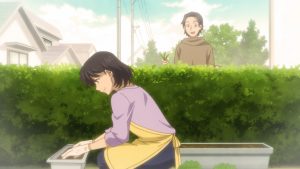 Every new kernel of information Subaru learns – like the fact that his mother always made a reservation for three, just in case he could ever be persuaded to come along – is another cruel blow. But he needs to know these things, which his mother never had the chance to share with him – they can be a source of courage to change, just as his own writing is for his readers. Unfortunately, while Subaru does have a bit of an epiphany in Tokushima and thanks to the generosity of the ryokan owner, gains a new resident for the garden, the weather turns and his flight home is cancelled. And for Haru (this is an exceptionally strong episode despite her relatively minimal perspective time), Subaru’s absence isn’t really about food or water, it’s about security. That leads us to the events that will provide the drama in the final episode – one which has come along far, far too soon.
Every new kernel of information Subaru learns – like the fact that his mother always made a reservation for three, just in case he could ever be persuaded to come along – is another cruel blow. But he needs to know these things, which his mother never had the chance to share with him – they can be a source of courage to change, just as his own writing is for his readers. Unfortunately, while Subaru does have a bit of an epiphany in Tokushima and thanks to the generosity of the ryokan owner, gains a new resident for the garden, the weather turns and his flight home is cancelled. And for Haru (this is an exceptionally strong episode despite her relatively minimal perspective time), Subaru’s absence isn’t really about food or water, it’s about security. That leads us to the events that will provide the drama in the final episode – one which has come along far, far too soon.




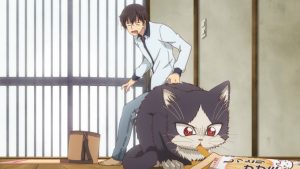
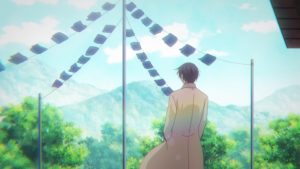
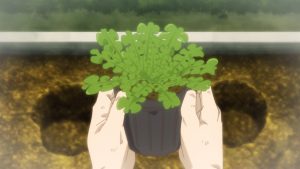
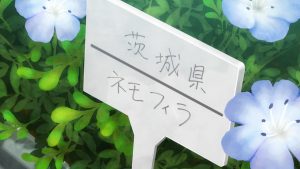


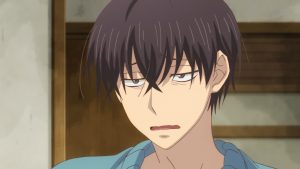
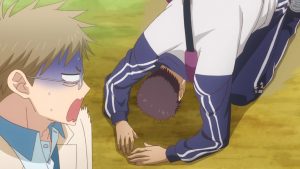
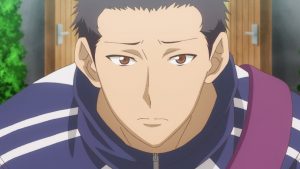
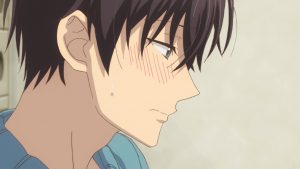
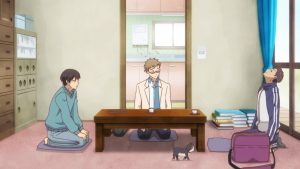
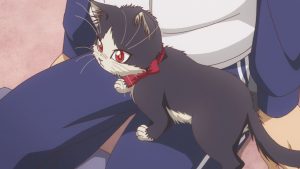
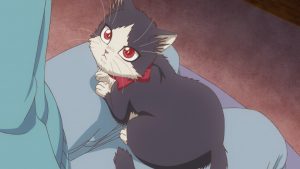

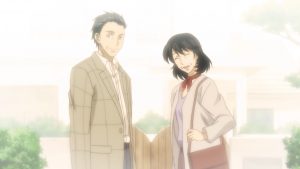
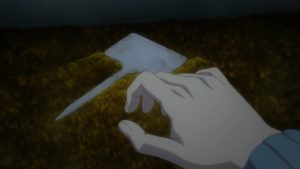

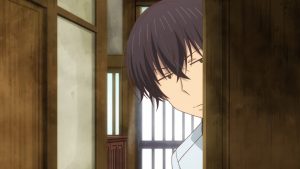
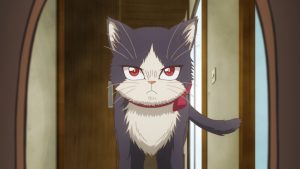
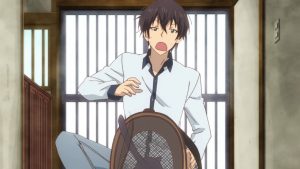

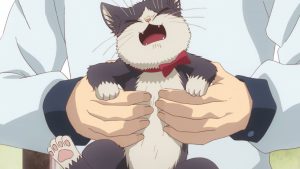

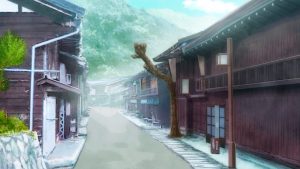
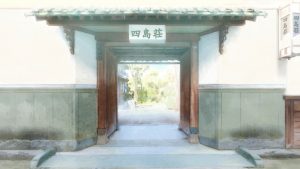
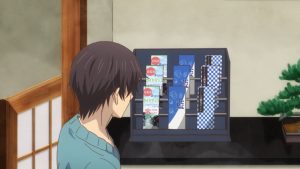
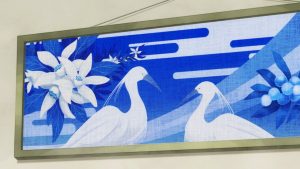
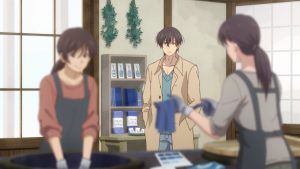
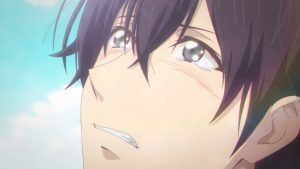
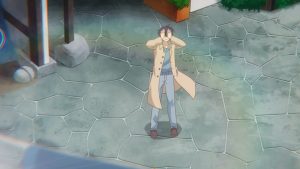


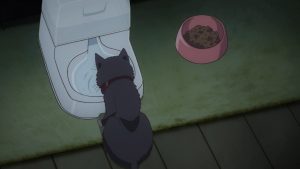
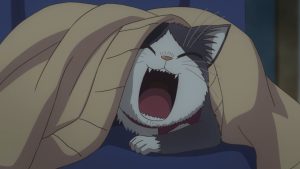
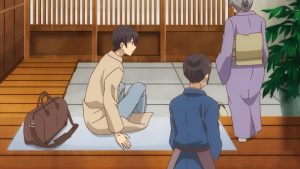
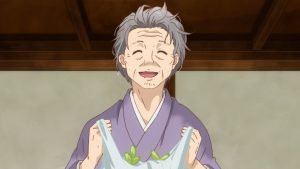
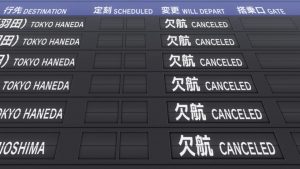
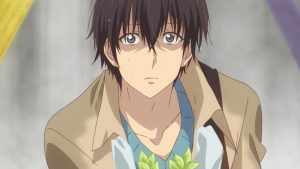


m
March 21, 2019 at 5:14 pmThe fact that the strongest episode of doukyonin no hiza (so far) was an episode with almost all Subaru’s perspective in it is saying a lot, cause I almost dropped it at the beginning of the season if not because of Haru. The Subaru of the first episode was a grumpy, unpleasant man, but his growth in every episode has been tremendous and has been a joy to watch.
This show: come for the cute cat action with Haru, stay for watching Subaru slowly opening up to people and facing his grief over the lost of his parents
Guardian Enzo
March 21, 2019 at 7:31 pmArcs are more interesting when there’s real growth involved, so I’m not necessarily bothered by them being unlikable in the first episode. Gives them more room to progress.
DnAfan
March 22, 2019 at 3:06 amMissed the fact that Subaru’s parents passed away only 3 years ago. The timeline of traumatic events can be very vague in anime. Grief is so very personal but am glad it was not a very long time that Subaru was alone and locked in himself and emotions before Haru came into his life. Favorite scene is when Haru pulled the sweater around her for comfort.
Next episode looks so dramatic. The usual turn of events would be everyone coming together to find her with the climax of Subaru finding Haru. It would be interesting if say Nana or Kawase found her and brought her back home. I read somewhere this anime is popular in japan among young women. If that is true maybe one day second season?!
Guardian Enzo
March 22, 2019 at 6:29 amWell, it runs in a josei mag so theoretically women would be the core audience. Last volume sold about 100K before it dropped off the charts, which is really pretty decent. I kind of think a second season is unlikely, but it wouldn’t be the most surprising sequel of the last few years.
Marty
March 22, 2019 at 6:57 amThat Kawase rejection was as brutal as it was nonchalant.
Interestingly enough, I feel like the animals have been given enough character that the audience could surmise what they’re thinking.
Episodes like this are a perfect example of how something doesn’t have to be bombastic or over-the-top to feel true and tug at the heartstrings.